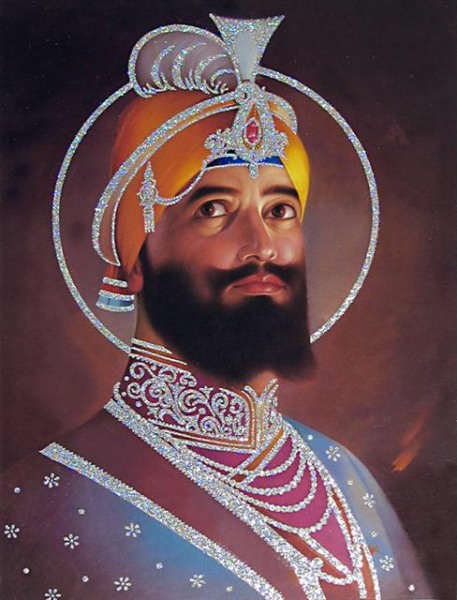Title: Shri Guru Gobind Singh Ji: The Tenth Guru and the Defender of Sikhism
Shri Guru Gobind Singh Ji, the tenth and final Guru of Sikhism, is widely regarded as one of the most influential figures in Sikh history. Born on December 22, 1666, in Patna Sahib, Bihar, India, Guru Gobind Singh Ji played a pivotal role in shaping the Sikh community and its values. His life was marked by his extraordinary courage, leadership, and unwavering commitment to justice. This article delves into the life, teachings, and significant contributions of Shri Guru Gobind Singh Ji, highlighting his profound impact on Sikhism and his enduring legacy.

Early Life and Spiritual Journey:
Guru Gobind Singh Ji was born to Guru Teg Bahadur Sahib Ji, the ninth Guru of Sikhism, and Mata Gujri Ji. From an early age, he displayed remarkable intellect and spiritual wisdom. Guru Gobind Singh Ji received a comprehensive education, encompassing spiritual teachings, martial arts, and various languages. He demonstrated his poetic prowess by composing powerful verses that would later be compiled in the sacred scripture, Dasam Granth Sahib.
Guru Gobind Singh Ji’s Appointment as the Tenth Guru:
Following the martyrdom of his father, Guru Teg Bahadur Sahib Ji, Guru Gobind Singh Ji was formally appointed as the tenth Guru of the Sikhs at the tender age of nine. Despite his young age, he shouldered the responsibility of leading the Sikh community and preserving the values of Sikhism.
The Formation of the Khalsa:
One of Guru Gobind Singh Ji’s most significant contributions was the establishment of the Khalsa, a community of initiated Sikhs who vowed to uphold the highest moral and ethical standards. On April 13, 1699, Guru Gobind Singh Ji initiated the first five members of the Khalsa, known as the Panj Pyare (the Five Beloved Ones). He then became the sixth member of the Khalsa, emphasizing the principle of equality and unity among all Sikhs.
Warrior and Defender of the Faith:
Guru Gobind Singh Ji faced numerous challenges and conflicts during his lifetime, including the persecution of Sikhs under the Mughal Empire. He tirelessly fought to defend Sikhism and protect the rights of all individuals to practice their faith freely. Guru Gobind Singh Ji displayed immense valor and led his followers in battles against oppressive forces, inspiring them with his fearlessness and unwavering spirit.
The Creation of the Guru Granth Sahib:
Recognizing the importance of a permanent spiritual guide for the Sikh community, Guru Gobind Singh Ji declared the Guru Granth Sahib, the holy scripture of Sikhism, as the eternal Guru of the Sikhs. He compiled the writings of the previous Gurus and other saints into the Guru Granth Sahib, ensuring that the divine wisdom would guide generations to come.
Martyrdom and Legacy:
In 1708, before his martyrdom, Guru Gobind Singh Ji declared that there would be no more human Gurus after him and that the Guru Granth Sahib would be the eternal spiritual guide for Sikhs. He passed away on October 7, 1708, leaving behind a rich legacy of bravery, sacrifice, and devotion.
Guru Gobind Singh Ji’s teachings continue to inspire Sikhs and people worldwide. His emphasis on the principles of equality, justice, and selfless service resonates strongly, reminding individuals to stand up against injustice and tyranny. The Khalsa, established by Guru Gobind Singh Ji, embodies the ideals of courage, righteousness, and social responsibility.
Shri Guru Gobind Singh Ji’s life and teachings exemplify the core values of Sikhism. As the tenth Guru, he played a crucial role in the preservation and growth of Sikhism, leaving an indelible mark on the Sikh community and the world. His legacy as a warrior, poet, philosopher, and visionary continues to inspire millions, encouraging them to live with courage, compassion, and unwavering faith. Guru Gobind Singh Ji’s contributions have shaped Sikh history and continue to guide Sikhs on the path of righteousness and devotion to this day.
in Other way (Language)
Sri Guru Gobind Singh Ji: The Saint-Soldier, Poet, and Inspirational Leader
Sri Guru Gobind Singh Ji, the tenth Guru of Sikhism, was born on December 22, 1666, in Patna Sahib, Bihar, India. His father was Sri Guru Tegh Bahadur Ji, the ninth Guru, and his mother was Mata Gujari. Guru Gobind Singh Ji played a vital role in shaping Sikh history and inspiring generations with his extraordinary contributions. Let us explore the life, teachings, and significant achievements of this revered spiritual figure.
Guru Gobind Singh Ji’s Spiritual Journey:
From a young age, Guru Gobind Singh Ji exhibited wisdom and spiritual depth beyond his years. He received an excellent education that encompassed religious teachings, martial arts, and various languages. Guru Gobind Singh Ji composed poetic verses, many of which are included in the Dasam Granth Sahib, a sacred scripture revered by Sikhs.
The Creation of the Khalsa:
One of Guru Gobind Singh Ji’s most significant contributions was the establishment of the Khalsa, a community of initiated Sikhs who dedicated themselves to upholding Sikh values and principles. On April 13, 1699, Guru Gobind Singh Ji initiated the first five members of the Khalsa, known as the Panj Pyare (the Five Beloved Ones). He himself became the sixth member, emphasizing equality and unity among all Sikhs.
A Saint-Soldier and Poet:
Guru Gobind Singh Ji was not only a spiritual leader but also a fearless warrior. He took up arms to defend against religious persecution and oppression. Through his soul-stirring poetry, Guru Gobind Singh Ji inspired people to fight against injustice and stand up for righteousness. His poetic compositions, including Jap Sahib, Akal Ustati, Var Bhagoti Ji Ki (Chandi di Var), and Zafarnama, found in the Dasam Granth, continue to resonate with Sikhs around the world.
Battles and Challenges:
Guru Gobind Singh Ji faced numerous battles against the Mughal monarchy and Hill Chiefs who sought to suppress religious freedom. He fearlessly led his followers and fought to protect the Sikh community from persecution. His unwavering spirit and courage inspired his warriors to stand firm in the face of adversity.
Legacy and Teachings:
Guru Gobind Singh Ji’s profound teachings centered on righteousness, equality, and devotion to the Supreme Being. He preached against the worship of idols, emphasized the importance of a personal connection with the divine, and upheld the principle of One God. Guru Gobind Singh Ji encouraged his followers to eradicate societal divisions and live by the principles of truth, justice, and compassion.
Passing the Gurugaddi:
Before his eternal rest on October 7, 1708, in Nanded, Maharashtra, Guru Gobind Singh Ji declared that the eternal spiritual guide for Sikhs would be Sri Guru Granth Sahib Ji, the sacred scripture of Sikhism. He proclaimed that there would be no more human Gurus after him, ensuring the continuity of Sikh principles and values.
Sri Guru Gobind Singh Ji’s life and teachings continue to inspire millions of Sikhs worldwide. His legacy as a saint-soldier, poet, and visionary leader remains deeply ingrained in Sikh history. Guru Gobind Singh Ji’s creation of the Khalsa, his fearlessness in battle, and his profound poetry continue to guide Sikhs on the path of righteousness and inspire individuals to stand up against injustice. His teachings of equality, devotion, and service to humanity serve as a guiding light for all who seek spiritual enlightenment and a just society.
Gurbani By Shri Guru Gobind Singh Ji
Most Popular Gurbaani From Dasam Granth Sahib Ji
Jaap Sahib, Twparsaad Swayiye and Choupai Sahib
Here We Write Choupai Sahib By Sahib Shri Guru Gobind Singh Ji Maharaj
Chaupai Sahib in Punjabi
ਕਬ੍ਯੋ ਬਾਚ ਬੇਨਤੀ ॥
ਚੌਪਈ ॥
ਹਮਰੀ ਕਰੋ ਹਾਥ ਦੈ ਰਛਾ ॥
ਪੂਰਨ ਹੋਇ ਚਿਤ ਕੀ ਇਛਾ ॥
ਤਵ ਚਰਨਨ ਮਨ ਰਹੈ ਹਮਾਰਾ ॥
ਅਪਨਾ ਜਾਨ ਕਰੋ ਪ੍ਰਤਿਪਾਰਾ ॥੩੭੭॥
ਹਮਰੇ ਦੁਸਟ ਸਭੈ ਤੁਮ ਘਾਵਹੁ ॥
ਆਪੁ ਹਾਥ ਦੈ ਮੋਹਿ ਬਚਾਵਹੁ ॥
ਸੁਖੀ ਬਸੈ ਮੋਰੋ ਪਰਿਵਾਰਾ ॥
ਸੇਵਕ ਸਿਖ੍ਯ ਸਭੈ ਕਰਤਾਰਾ ॥੩੭੮॥
ਮੋ ਰਛਾ ਨਿਜੁ ਕਰ ਦੈ ਕਰਿਯੈ ॥
ਸਭ ਬੈਰਿਨ ਕੌ ਆਜ ਸੰਘਰਿਯੈ ॥
ਪੂਰਨ ਹੋਇ ਹਮਾਰੀ ਆਸਾ ॥
ਤੋਰਿ ਭਜਨ ਕੀ ਰਹੈ ਪਿਯਾਸਾ ॥੩੭੯॥
ਤੁਮਹਿ ਛਾਡਿ ਕੋਈ ਅਵਰ ਨ ਧ੍ਯਾਊ ॥
ਜੋ ਬਰ ਚਾਹੌ ਸੁ ਤੁਮ ਤੇ ਪਾਊ ॥
ਸੇਵਕ ਸਿਖ੍ਯ ਹਮਾਰੇ ਤਾਰਿਯਹਿ ॥
ਚੁਨ ਚੁਨ ਸਤ੍ਰੁ ਹਮਾਰੇ ਮਾਰਿਯਹਿ ॥੩੮੦॥
ਆਪੁ ਹਾਥ ਦੈ ਮੁਝੈ ਉਬਰਿਯੈ ॥
ਮਰਨ ਕਾਲ ਕਾ ਤ੍ਰਾਸ ਨਿਵਰਿਯੈ ॥
ਹੂਜੋ ਸਦਾ ਹਮਾਰੇ ਪਛਾ ॥
ਸ੍ਰੀ ਅਸਿਧੁਜ ਜੂ ਕਰਿਯਹੁ ਰਛਾ ॥੩੮੧॥
ਰਾਖਿ ਲੇਹੁ ਮੁਹਿ ਰਾਖਨਹਾਰੇ ॥
ਸਾਹਿਬ ਸੰਤ ਸਹਾਇ ਪਿਯਾਰੇ ॥
ਦੀਨਬੰਧੁ ਦੁਸਟਨ ਕੇ ਹੰਤਾ ॥
ਤੁਮ ਹੋ ਪੁਰੀ ਚਤੁਰਦਸ ਕੰਤਾ ॥੩੮੨॥
ਕਾਲ ਪਾਇ ਬ੍ਰਹਮਾ ਬਪੁ ਧਰਾ ॥
ਕਾਲ ਪਾਇ ਸਿਵ ਜੂ ਅਵਤਰਾ ॥
ਕਾਲ ਪਾਇ ਕਰਿ ਬਿਸਨ ਪ੍ਰਕਾਸਾ ॥
ਸਕਲ ਕਾਲ ਕਾ ਕੀਯਾ ਤਮਾਸਾ ॥੩੮੩॥
ਜਵਨ ਕਾਲ ਜੋਗੀ ਸਿਵ ਕੀਯੋ ॥
ਬੇਦ ਰਾਜ ਬ੍ਰਹਮਾ ਜੂ ਥੀਯੋ ॥
ਜਵਨ ਕਾਲ ਸਭ ਲੋਕ ਸਵਾਰਾ ॥
ਨਮਸਕਾਰ ਹੈ ਤਾਹਿ ਹਮਾਰਾ ॥੩੮੪॥
ਜਵਨ ਕਾਲ ਸਭ ਜਗਤ ਬਨਾਯੋ ॥
ਦੇਵ ਦੈਤ ਜਛਨ ਉਪਜਾਯੋ ॥
ਆਦਿ ਅੰਤਿ ਏਕੈ ਅਵਤਾਰਾ ॥
ਸੋਈ ਗੁਰੂ ਸਮਝਿਯਹੁ ਹਮਾਰਾ ॥੩੮੫॥
ਨਮਸਕਾਰ ਤਿਸ ਹੀ ਕੋ ਹਮਾਰੀ ॥
ਸਕਲ ਪ੍ਰਜਾ ਜਿਨ ਆਪ ਸਵਾਰੀ ॥
ਸਿਵਕਨ ਕੋ ਸਿਵਗੁਨ ਸੁਖ ਦੀਯੋ ॥
ਸਤ੍ਰੁਨ ਕੋ ਪਲ ਮੋ ਬਧ ਕੀਯੋ ॥੩੮੬॥
ਘਟ ਘਟ ਕੇ ਅੰਤਰ ਕੀ ਜਾਨਤ ॥
ਭਲੇ ਬੁਰੇ ਕੀ ਪੀਰ ਪਛਾਨਤ ॥
ਚੀਟੀ ਤੇ ਕੁੰਚਰ ਅਸਥੂਲਾ ॥
ਸਭ ਪਰ ਕ੍ਰਿਪਾ ਦ੍ਰਿਸਟਿ ਕਰਿ ਫੂਲਾ ॥੩੮੭॥
ਸੰਤਨ ਦੁਖ ਪਾਏ ਤੇ ਦੁਖੀ ॥
ਸੁਖ ਪਾਏ ਸਾਧਨ ਕੇ ਸੁਖੀ ॥
ਏਕ ਏਕ ਕੀ ਪੀਰ ਪਛਾਨੈ ॥
ਘਟ ਘਟ ਕੇ ਪਟ ਪਟ ਕੀ ਜਾਨੈ ॥੩੮੮॥
ਜਬ ਉਦਕਰਖ ਕਰਾ ਕਰਤਾਰਾ ॥
ਪ੍ਰਜਾ ਧਰਤ ਤਬ ਦੇਹ ਅਪਾਰਾ ॥
ਜਬ ਆਕਰਖ ਕਰਤ ਹੋ ਕਬਹੂੰ ॥
ਤੁਮ ਮੈ ਮਿਲਤ ਦੇਹ ਧਰ ਸਭਹੂੰ ॥੩੮੯॥
ਜੇਤੇ ਬਦਨ ਸ੍ਰਿਸਟਿ ਸਭ ਧਾਰੈ ॥
ਆਪੁ ਆਪੁਨੀ ਬੂਝਿ ਉਚਾਰੈ ॥
ਤੁਮ ਸਭ ਹੀ ਤੇ ਰਹਤ ਨਿਰਾਲਮ ॥
ਜਾਨਤ ਬੇਦ ਭੇਦ ਅਰੁ ਆਲਮ ॥੩੯੦॥
ਨਿਰੰਕਾਰ ਨ੍ਰਿਬਿਕਾਰ ਨ੍ਰਿਲੰਭ ॥
ਆਦਿ ਅਨੀਲ ਅਨਾਦਿ ਅਸੰਭ ॥
ਤਾ ਕਾ ਮੂੜ ਉਚਾਰਤ ਭੇਦਾ ॥
ਜਾ ਕੋ ਭੇਵ ਨ ਪਾਵਤ ਬੇਦਾ ॥੩੯੧॥
ਤਾ ਕੌ ਕਰਿ ਪਾਹਨ ਅਨੁਮਾਨਤ ॥
ਮਹਾ ਮੂੜ ਕਛੁ ਭੇਦ ਨ ਜਾਨਤ ॥
ਮਹਾਦੇਵ ਕੌ ਕਹਤ ਸਦਾ ਸਿਵ ॥
ਨਿਰੰਕਾਰ ਕਾ ਚੀਨਤ ਨਹਿ ਭਿਵ ॥੩੯੨॥
ਆਪੁ ਆਪੁਨੀ ਬੁਧਿ ਹੈ ਜੇਤੀ ॥
ਬਰਨਤ ਭਿੰਨ ਭਿੰਨ ਤੁਹਿ ਤੇਤੀ ॥
ਤੁਮਰਾ ਲਖਾ ਨ ਜਾਇ ਪਸਾਰਾ ॥
ਕਿਹ ਬਿਧਿ ਸਜਾ ਪ੍ਰਥਮ ਸੰਸਾਰਾ ॥੩੯੩॥
ਏਕੈ ਰੂਪ ਅਨੂਪ ਸਰੂਪਾ ॥
ਰੰਕ ਭਯੋ ਰਾਵ ਕਹੀ ਭੂਪਾ ॥
ਅੰਡਜ ਜੇਰਜ ਸੇਤਜ ਕੀਨੀ ॥
ਉਤਭੁਜ ਖਾਨਿ ਬਹੁਰਿ ਰਚਿ ਦੀਨੀ ॥੩੯੪॥
ਕਹੂੰ ਫੂਲਿ ਰਾਜਾ ਹ੍ਵੈ ਬੈਠਾ ॥
ਕਹੂੰ ਸਿਮਟਿ ਭਯੋ ਸੰਕਰ ਇਕੈਠਾ ॥
ਸਗਰੀ ਸ੍ਰਿਸਟਿ ਦਿਖਾਇ ਅਚੰਭਵ ॥
ਆਦਿ ਜੁਗਾਦਿ ਸਰੂਪ ਸੁਯੰਭਵ ॥੩੯੫॥
ਅਬ ਰਛਾ ਮੇਰੀ ਤੁਮ ਕਰੋ ॥
ਸਿਖ੍ਯ ਉਬਾਰਿ ਅਸਿਖ੍ਯ ਸੰਘਰੋ ॥
ਦੁਸਟ ਜਿਤੇ ਉਠਵਤ ਉਤਪਾਤਾ ॥
ਸਕਲ ਮਲੇਛ ਕਰੋ ਰਣ ਘਾਤਾ ॥੩੯੬॥
ਜੇ ਅਸਿਧੁਜ ਤਵ ਸਰਨੀ ਪਰੇ ॥
ਤਿਨ ਕੇ ਦੁਸਟ ਦੁਖਿਤ ਹ੍ਵੈ ਮਰੇ ॥
ਪੁਰਖ ਜਵਨ ਪਗੁ ਪਰੇ ਤਿਹਾਰੇ ॥
ਤਿਨ ਕੇ ਤੁਮ ਸੰਕਟ ਸਭ ਟਾਰੇ ॥੩੯੭॥
ਜੋ ਕਲਿ ਕੌ ਇਕ ਬਾਰ ਧਿਐਹੈ ॥
ਤਾ ਕੇ ਕਾਲ ਨਿਕਟਿ ਨਹਿ ਐਹੈ ॥
ਰਛਾ ਹੋਇ ਤਾਹਿ ਸਭ ਕਾਲਾ ॥
ਦੁਸਟ ਅਰਿਸਟ ਟਰੈਂ ਤਤਕਾਲਾ ॥੩੯੮॥
ਕ੍ਰਿਪਾ ਦ੍ਰਿਸਟਿ ਤਨ ਜਾਹਿ ਨਿਹਰਿਹੋ ॥
ਤਾ ਕੇ ਤਾਪ ਤਨਕ ਮਹਿ ਹਰਿਹੋ ॥
ਰਿਧਿ ਸਿਧਿ ਘਰ ਮੋ ਸਭ ਹੋਈ ॥
ਦੁਸਟ ਛਾਹ ਛ੍ਵੈ ਸਕੈ ਨ ਕੋਈ ॥੩੯੯॥
ਏਕ ਬਾਰ ਜਿਨ ਤੁਮੈ ਸੰਭਾਰਾ ॥
ਕਾਲ ਫਾਸ ਤੇ ਤਾਹਿ ਉਬਾਰਾ ॥
ਜਿਨ ਨਰ ਨਾਮ ਤਿਹਾਰੋ ਕਹਾ ॥
ਦਾਰਿਦ ਦੁਸਟ ਦੋਖ ਤੇ ਰਹਾ ॥੪੦੦॥
ਖੜਗਕੇਤੁ ਮੈ ਸਰਨਿ ਤਿਹਾਰੀ ॥
ਆਪੁ ਹਾਥ ਦੈ ਲੇਹੁ ਉਬਾਰੀ ॥
ਸਰਬ ਠੌਰ ਮੋ ਹੋਹੁ ਸਹਾਈ ॥
ਦੁਸਟ ਦੋਖ ਤੇ ਲੇਹੁ ਬਚਾਈ ॥੪੦੧॥

